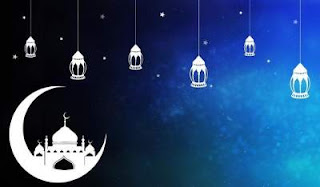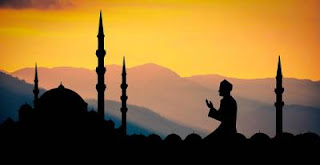One of the nights of Ramadan is called Shab-e-Qadr, which is a very blessed night and in which worship has been described in the Holy Qur'an (Surat al-Qadr) as better than a thousand months. A thousand months have 3 years and 6 months. As if the worship of this night is better than the worship of the whole life. And how much more than a thousand months? This is known only to him. It is known from the instructions of the Holy Prophet PBUH that this night takes place in the last ten days of Ramadan. So don't miss a single moment of this last decade. Arrange for the five prayers to be recited in a congregation, fast during the day, spend most of the night in worship, arrange for Taraweeh and Tahajjud, remember the Almighty, pray for yourself and the Muslim Ummah, recite the Holy Qur'an more.
 |
| Shab-e-Qadr |
Regarding the importance and virtue of Shab-e-Qadr, the Creator of the universe says: Indeed, We have sent down the Holy Qur'an on Shab-e-Qadr, that is, We have sent down the Holy Qur'an from the Preserved Tablet to the heavens and the earth in this night. You also know how great the night of Qadr is, that is, you also know the greatness and virtue of this night, how many virtues and how many virtues are in it. Then he mentions a few virtues. Shab-e-Qadr is better than a thousand months, that is, the reward of worshiping for a thousand months is more than the reward of worshiping Shab-e-Qadr, and how much more? This is already known. On this night angels and Gabriel descend. By the command of their Lord, they descend to the earth with good deeds. And this blessing lasts until dawn. (Surat al-Qadr)
The revelation of the Holy Qur'an began with the first few verses of Surah Al-Alaq (Read in the name of your Lord Who created ...). It is stated in the following Surah Al-Qadr that this Holy Qur'an was revealed on the blessed night of Ramadan, as in verse 3 of Surah Al-Dukhan (We have revealed it in the blessed night). And this verse is explicitly mentioned in verse 2 of Surah Al-Baqarah (The City of Ramadan which was revealed in the month of Ramadan).
Meaning of Shab-e-Qadr:
Shab-e-Qadr has two meanings and both are meant here. One is that this is the night in which the decisions of the destinies are made, as in Surah Al-Dukhan, verse no. 1: The second meaning is that it is a night of great honor and dignity, as mentioned in detail in Surah Al-Qadr. The revelation of the Holy Qur'an on this night means that the sky descends from the Preserved Tablet to the heavens or the whole world on this night. It refers to the revelation of the Holy Qur'an to the angels or it means that the revelation of the Holy Qur'an began on that night and then according to the events and circumstances it was revealed to the Holy Prophet from time to time for a period of 5 years.
The Virtue of Laylat al-Qadr in the words of the Holy Prophet (saw):
There are many ahaadeeth in the books of hadeeths about the virtue and importance of Shab-e-Qadr. For the sake of brevity, I am mentioning a few ahaadeeth here. The Prophet (peace and blessings of Allaah be upon him) said: Whoever stands (for worship) on the Night of Destiny with faith and with the intention of reward, all his past sins are forgiven. (Bukhari and Muslim) Standing means: praying, reciting the Qur'an and engaging in remembrance, etc. To hope for a reward means to act for the sake of gaining the pleasure of the pure, not for the sake of fame and ostentation. The Prophet (peace and blessings of Allaah be upon him) said: A month has come upon you in which there is a night which is a thousand. Better than months. The person who is deprived of this night is as if he has been deprived of all good, and he is not deprived of his goodness except the person who is truly deprived. (Ibn Majah) The Prophet (peace and blessings of Allaah be upon him) said: Look for the night of Qadr in the odd nights of the last ten days of Ramadaan. (Bukhari) According to the above hadith, the search for Shab-e-Qadr should be done on the 7th, 8th, 9th, 9th, and 9th nights. Hazrat Ayesha (RA) asked the Holy Prophet (PBUH): Should I pray when he leaves? The Holy Prophet (peace and blessings of Allaah be upon him) said: Read: Allaah is the Forgiver, the Lover, the Forgiver, the Forgiver.
Two important signs of Laylat al-Qadr:
Two important signs of Laylat al-Qadr are mentioned in books of hadith: one is that the night is neither too hot nor too cold and the other sign is that the sun rises in the morning after Laylat al-Qadr There are no rays of the sun at that time. Note: Due to differences of study, there is no problem if Shab-e-Qadr is on different days in different countries and cities because according to each place, the night which will be considered as Shab-e-Qadr will have the blessings of Shab-e-Qadr on the same night. InshaAllah.
 |
| prayer |
Arranging Tahajjud Prayers:
Try to perform Tahajjud prayers on the precious nights of the last ten days which can be done in two rak'ats up to twelve rak'ats There is no difficulty in reciting a few rak'ahs at dawn. In the light of Qur'an and Hadith, the Muslim Ummah agrees that the chief of all the sons of Versailles, the best and highest human being in the universe and all the human beings who came to the Day of Resurrection after the Prophethood of the Holy Prophet spent a large part of his life in prayer. The Almighty Himself has stated in the Holy Qur'an (Surat al-Muzammil) that the Prophet (peace and blessings of Allaah be upon him) used to perform Tahajjud prayers daily for two-thirds of the night or sometimes at midnight or sometimes for one-third of the night. The Prophet (peace and blessings of Allaah be upon him) of all mankind had a deep connection with prayer and the state of his condition in prayer. Even a person with little knowledge of books can see how long prayers were offered to the Holy Prophet.
The Almighty's loving address to the Holy Prophet (saw) is that you should perform Tahajjud prayers in the greater part of the night: (O you who are wrapped in the chador, leave a small part of the night and stand up for the rest of the night (for worship). Part or less than half or more and recite the Qur'an with satisfaction. (Surat al-Muzammil: 1.2) Similarly, in the last verse of Surat al-Muzammil, the Lord of Glory says: (O Prophet!) Your Lord knows that you are near two-thirds of the night and sometimes at midnight and sometimes one-third of the night. Stand up for the prayer of Allah and a group of your companions (do the same).
Hazrat Ayesha (RA) says that Hazrat Akram used to stay up at night ie perform Tahajjud prayers until his blessed feet became swollen. (Sahih Bukhari) From personal experience, it is known that one or two hours of prayers do not cause swelling in the feet, but in a large part of the night, there is swelling due to standing in front of the Almighty, long bowing, and prostration. He used to recite long surahs like Surah Al-Baqarah and Surah Al-Imran in one rak'ah and that too with great satisfaction. From the first verses of Surah Al-Muzammil, the last verse, the above-mentioned hadith, and other hadiths, it is clear that the Prophet (peace and blessings of Allaah be upon him) used to perform Tahajjud prayers two-thirds or half or one-third of the night. Regarding the Holy Prophet (PBUH) of Madinah, the chief and the crown prince of all the Prophets, it was said that he should have a special interest in prayers. Therefore, the instructions of the Holy Prophet (saw) are also testifying to this.
Tags:
Education
